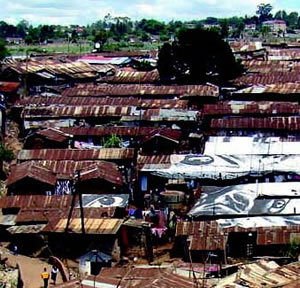A Promising New Career in the Slums of Kibera
CDC IN KENYA BLOG
August 9th, 2011 2:28 pm ET – U.S. CDC Kenya Office

During a presentation of school uniforms to orphans in Johannesburg, the staff of The Aurum Institute, a CDC South Africa partner, pledged their commitments to take responsibility for knowing their HIV status.
It has been six years, but Kennedy Odero can still remember perfectly the day he first crossed paths with CDC-Kenya. ‘I was attending a local church function, and I heard an announcement that the CDC was looking for people to train as community health workers,’ recalls Odero. ‘At the time, I had another job, but it was not utilizing my skills appropriately.’
A graduate of prestigious Moi University in western Kenya, Odero had completed undergraduate degrees in both Social Studies and Public Administration. Hoping to find a job he could feel passionate about, he relocated to Nairobi soon after graduation and moved in with relatives in Kibera, one of Africa’s largest slums. He immediately began job-hunting throughout Kenya’s sprawling metropolis, but months passed and the right opportunity still eluded him. He had no way of knowing that he would find his ideal career, not in some prosperous Nairobi locality, but in the slum neighborhood he now called home.
Around the same time in 2005, CDC-Kenya was in the process of forming a partnership with local non-profit, Carolina for Kibera. The alliance was created to provide a home base for CDC-Kenya infectious disease surveillance activities, which required sustainable contact with a large urban slum population; and to simultaneously improve access to life-saving healthcare services at Tabitha clinic, Carolina for Kibera’s flagship project, located deep within the slum. It was from this unique collaboration that the CDC Community Interviewer was born.
After completing a rigorous training course, Odero became one of the earliest members of the Community Interviewer team at Tabitha clinic. Odero has since been promoted to the position of Field Coordinator. In this role, he directs the current team of Community Interviewers, oversees data collection, works to develop quality control systems, and serves as a link between Tabitha clinic management and the local community. The work has also inspired him to attend graduate school. ‘I am currently studying for a Masters in Medical Sociology,’ says Odero. ‘I have seen so much suffering, not because the right medical services don’t exist, but because of mismanagement in the healthcare system. My vision is to someday influence policy.’